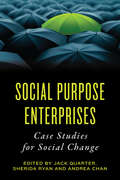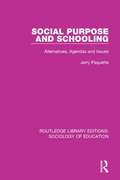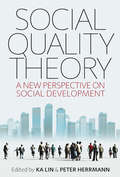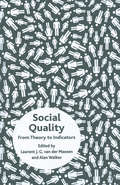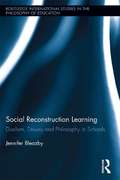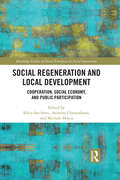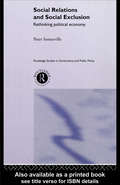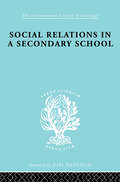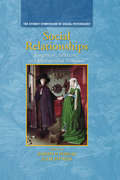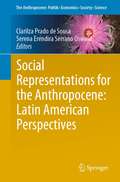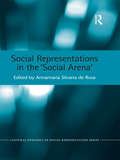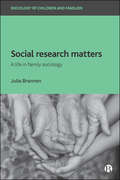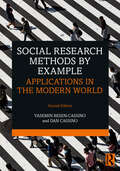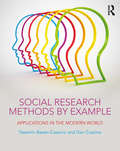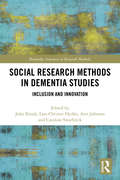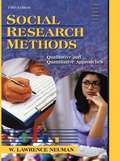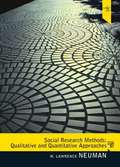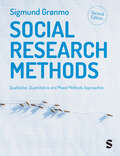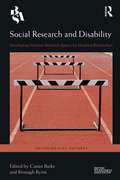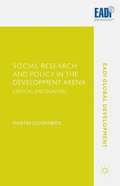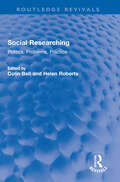- Table View
- List View
Social Purpose Enterprises
by Jack Quarter Sherida Ryan Andrea ChanSocial Purpose Enterprises: Case Studies for Social Change presents case studies of twelve organizations that operate in a growing niche within the Canadian social economy: market-based entities supported by a nonprofit organization and operated for the benefit of a workforce who lives on the margins of society.Using a variety of research methods, the contributors examine the work of social purpose enterprises in a range of businesses including food service, child care, furniture, courier services, and microfinance. Combining the experience of academics and practitioners, each chapter analyses the economic, social, and policy implications of the case.Building on research published in Researching the Social Economy (2010) and Businesses with a Difference (2013), Social Purpose Enterprises provides a valuable resource for those involved in the growing push to encourage market-based solutions for those on the social margins.
Social Purpose and Schooling: Alternatives, Agendas and Issues (Routledge Library Editions: Sociology of Education #43)
by Jerry PaquetteFirst published in 1991, this work critically analyses the competing claims about alternative arrangements for schooling. It does so in light of major popularly understood agendas for social and political purpose, and of the troubled and much less clearly understood assumptions and issues behind them. The book examines closely four generic types of arrangements for schooling in light of a comprehensive framework for understanding the publicness or privateness of schools, and the relationships between social and educational purpose. The book poses key questions about the meaning and purpose of schooling in the rapidly evolving social, demographic and technological realities of the time. It also probes fundamental assumptions, values and beliefs behind educational and public policy-making. In doing so, it offers a way to make sense of unorthodox arrangements for the provision and funding of schools.
Social Quality Theory
by Ka Lin Peter HerrmannSocial quality thinking emerged from a critique of one-sided policies by breaking through the limitations previously set by purely economistic paradigms. By tracing its expansion and presenting different aspects of social quality theory, this volume provides an overview of a more nuanced approach, which assesses societal progress and introduces proposals that are relevant for policy making. Crucially, important components emerge with research by scholars from Asia, particularly China, eastern Europe, and other regions beyond western Europe, the theory's place of origin. As this volume shows, this rich diversity of approaches and their cross-national comparisons reveal the increasingly important role of social quality theory for informing political debates on development and sustainability.
Social Quality: From Theory to Indicators (Studies In Employment And Social Policy Ser. #Vol. 7)
by Alan Walker Laurent J. G. van der MaesenThis collection sets out the latest research on the concept of 'social quality', developing its theoretical foundations and applying it to pressing policy issues such as the future of the European Union and sustainable global development.
Social Rage: Emotion and Cultural Conflict (Sociology/Psychology/Reference #Vol. 1187)
by Bonnie BerryThis book defines and describes the meaning of social rage by examining the influence of social forces such as economic conditions, population diversity and power shifts. The role of media, in particular its encouragement of social rage through sensationalism, is also handled in this book. The author apporaches the issue of social rage on both an individual and a collective level with the goal of revealing its motivations and its impact.
Social Reconstruction Learning: Dualism, Dewey and Philosophy in Schools (Routledge International Studies in the Philosophy of Education #29)
by Jennifer BleazbyThis volume argues that educational problems have their basis in an ideology of binary opposites often referred to as dualism, which is deeply embedded in all aspects of Western society and philosophy, and that it is partly because mainstream schooling incorporates dualism that it is unable to facilitate the thinking skills, dispositions and understandings necessary for autonomy, democratic citizenship and leading a meaningful life. Drawing on the philosophy of John Dewey, feminist pragmatism, Matthew Lipman’s Philosophy for Children program, and the service learning movement, Bleazby proposes an approach to schooling termed "social reconstruction learning," in which students engage in philosophical inquiries with members of their community in order to reconstruct real social problems, arguing that this pedagogy can better facilitate independent thinking, imaginativeness, emotional intelligence, autonomy, and active citizenship.
Social Regeneration and Local Development: Cooperation, Social Economy and Public Participation (Routledge Studies in Social Enterprise & Social Innovation)
by Asimina Christoforou Silvia Sacchetti Michele MoscaSocial regeneration is about the transformative processes that, through institutional choices that embody cooperation and inclusion, develop opportunities and capabilities for weak categories, and transversally for society. The challenge of social regeneration can be addressed, in part, through organisational solutions increasingly identified with social economy organisations, since they are characterised by a social objective, cooperation and inclusive democratic governance. Besides the organisational element, Social Regeneration and Local Development provides a new perspective on interacting socio-economic factors, which can work in synergy with the social economy organisations model to promote and sustain social regeneration and well-being. Such elements include civic engagement and social capital, the nature of the welfare system, the use of physical assets in urban and rural areas, leadership, technology, and finance. By analysing organisational and contextual elements, this book offers an institutional perspective on how socio-economic systems can reply to challenges such as social and environmental degradation, financial crises, immigration, inequality, and marginalisation.
Social Relations and Social Exclusion: Rethinking Political Economy (Routledge Studies in Governance and Public Policy)
by Peter SomervilleExamining the rational individual, this book develops a new approach to the theory of social relations. It explores how far we make sense of society on the assumption that people act as independent and free individuals, exercising rational choice. Re-examining the family, community, workplace and state, the author offers a thorough and original critique of the social policies of 'New Labour'.
Social Relations and the Cuban Health Miracle
by Elizabeth KathFor Cuba's supporters, health is the most commonly cited evidence of the socialist system's success. Even critics often concede that this is the country's saving grace. Cuba's health statistics are indeed extraordinary. This small island outperforms virtually all of its neighboring countries and all countries of the same level of economic development. Some of its health statistics rival wealthy industrialized countries. Moreover, these health outcomes have resulted against all odds. Setting out to unravel this puzzle, the author finds that Cuba possesses an unusually high level of popular participation and cooperation in the implementation of health policy. This has been achieved with the help of a longstanding government that prioritizes public health, and has enough political influence to compel the rest of the community to do the same. On the other hand, popular participation in decision-making regarding health policy is minimal, which contrasts with the image of popular participation often promoted. Political elites design and impose health policy, allowing little room for other health sector groups to meaningfully contribute to or protest official decisions. This is a problem because aspects of health care that are important to those who use the system or work within it can be neglected if they do not fit within official priorities. The author remains, overall, supportive of health achievement in Cuba. The country's preventive arrangements, its collective prioritization of key health areas, the improvements in public access to health services through the expansion of health facilities and the provision of free universal care are among the accomplishments that set it apart. The sustainability and progress of these achievements, however, must involve open recognition and public discussion of weaker aspects of the health system.
Social Relations in Human and Societal Development
by Charis Psaltis Alex Gillespie Anne-Nelly Perret-ClermontSocial interaction is part of human life and is the engine which drives an individual's psychological development, creating changes on all levels of society. Through a collection of essays by internationally renowned academics from a range of disciplines, including social psychology, international relations and child development, Social Relations in Human and Societal Development examines the effect of this integral force on human life. Each chapter explores the role of social relations in a particular domain to provide a broad understanding of the role of social relations in human and societal development.
Social Relations in a Secondary School (International Library of Sociology)
by David Hargreaves Dr David HargreavesDrawing on the great wealth of knowledge and experience of education practitioners and theorists, the volumes in the Sociology of Education set of the International library of Sociology explore the very important relationship between education and society. These books became standard texts for actual and intending teachers. Drawing upon comparative material from Israel, France and Germany, titles in this set also discuss the key questions of girls' and special needs education, and the psychology of education.
Social Relationships: Cognitive, Affective and Motivational Processes (Sydney Symposium of Social Psychology #Vol. 10)
by Joseph P. Forgas Julie FitnessHuman beings are an intrinsically gregarious species - our personal relationships are of immense interest to us and are a key factor in achieving happiness and well being. From the moment of birth, humans crave love and intimacy and we devote much energy to creating and maintaining successful personal relationships throughout our personal and our working lives. However, modern industrialized societies present a particularly challenging environment for sustaining rewarding personal relationships. Understanding how people initiate, develop, maintain, and terminate relationships is one of the core issues in psychology, and the subject matter of this book. Contributors to this volume are all leading researchers in relationship science, and they seek here to explore and integrate the subtle influence that evolutionary, socio-cultural, and intra-psychic (cognitive, affective and motivational) variables play in relationship processes. In addition to discussing the latest advances in areas of relationship research, they also advocate an expanded theoretical approach that incorporates many of the insights gained from evolutionary psychology, social cognition, and research on affect and motivation. The contributions should be highly relevant to researchers, teachers, students, laypersons and to everyone who is interested in the subtleties of human relationships. The book is also highly recommended to clinical, health, and relationship professionals who deal with relationship issues in their daily work.
Social Representations for the Anthropocene: Latin American Perspectives (The Anthropocene: Politik—Economics—Society—Science #32)
by Serena Eréndira Serrano Oswald Clarilza Prado de SousaThe Anthropocene has become a field of studies in which the influence of human activity on the Earth System and nature is both the main threat and the potential solution. Social Representations Theory has been evolving since the 1960s.It links knowledge and practice in everyday life and is an effective way to deal with systemic crises based on common sense. This book assembles key contributions by Latin American scholars working with social representations in the social sciences that are of conceptual relevance to the study of the Anthropocene and that investigate the societal consequences of complex interrelations between common sense and topics of global relevance, such asthe contradictions of sustainable development, the construction of risks beyond risk-perception, health, negotiation and governance in the field of education, gender equality, the usefulness of longitudinal and systemic ethnography and case studies, and agency and the link between inequality, crises and risk society in the context of COVID-19, presenting theoretical and methodological innovations fromSpanish, Portuguese and Frenchresearchthat have rarely been available in English. • This is the first book to address the relevance of Social Representations Theory for the Anthropocene as a societal era• It presents the multidisciplinary scope of Social Representations• This book covers emerging research contributions in Social Representations Theory from Latin America• This book presents innovative research and commentaries by established researchers in the field• This multidisciplinary book should be in the libraries of many disciplines in the social sciences and humanities
Social Representations in the 'Social Arena' (Cultural Dynamics of Social Representation)
by Silvana de Rosa AnnamariaSocial Representations in the 'Social Arena' presents key theoretical issues and extensive empirical research using different theoretical and methodological approaches to consider the value of social representation theory when social representations are examined in real world contexts. This comprehensive text brings together international experts to explore the relevance of a variety of applications of social representation theory in both institutional and organizational settings, and discusses how social representation theory compares with other constructs of social psychology. Areas covered include: justice leadership health and mental illness intergroup relations identity politics environment and tourism economics. This book will appeal to a range of academic researchers and practitioners from a variety of fields who are concerned with the application of social representation theory to various contexts as a heuristic tool for addressing and understanding relevant societal issues faced with 'social demand'.
Social Research Matters: A Life in Family Sociology (Sociology of Children and Families)
by Julia BrannenFrom the vantage point of forty years in social research and the study of families, Julia Brannen offers an invaluable account of how research is conducted and ‘matters’ at particular times. This fascinating work covers key developments in the field that remain of vital concern to society and demonstrates how social research is an art as well as a science – a process that involves craft and creativity.
Social Research Methods by Example: Applications in the Modern World
by Dan Cassino Yasemin Besen-CassinoSocial Research Methods by Example sharpens students understanding of the research process and the essential research methods and tools that researchers use to perform their work on the cutting edge of the social sciences. The text is broken up into three major sections; the first provides a foundation for conducting research and forming a research question, executing an ethical approach, and drawing upon relevant theories and literature. The second provides a fully illustrated overview of different research methods including qualitative and quantitative design, constructing and administering surveys, and carrying out experiments. The authors conclude the text by considering notable current controversies and methodological changes that are impacting the discipline. The new edition offers expanded content on key statistical packages for conducting social research and takes readers behind-the-scenes of writing and presenting a research paper with annotated examples and step-by-step guidance. Far more than an introduction to the principles of social science research, this book leaves students with the skills and the applied know-how to carry out their own. It is an excellent resource for methods courses across the social sciences.
Social Research Methods by Example: Applications in the Modern World
by Dan Cassino Yasemin Besen-CassinoSocial Research Methods by Example shows students how researchers carry out work on the cutting edge of social science. The authors illustrate every point through engaging, thought-provoking examples from real research. The language is jargon-free, making research methods less intimidating and more relatable. The text is divided into three major sections, the first of which introduces students to the principles of research through examples from various fields. The second section walks students through the major types of social science research, with each chapter focusing on a different technique. The third section shows students how to carry out basic quantitative data analysis in SPSS. The final chapter shows how technological advances have changed the way researchers are working, and looks at the direction of social science research in the future. Social Research Methods by Example not only introduces students to the principles of social science research, but gives them a toolbox to carry out their own. By the time they are finished with the book, students will be conversant with many of the most important studies in the history of social science. They will understand not only how to conduct research, but also how the field has evolved over time.
Social Research Methods in Dementia Studies: Inclusion and Innovation (Routledge Advances in Research Methods)
by Ann Johnson John Keady Lars-Christer Hydén Caroline SwarbrickTraditionally, the most preferred social research methods in dementia studies have been interviews, focus groups and non-participant observations. Most of these methods have been used for a long time by researchers in other social research fields, but their application to the field of dementia studies is a relatively new phenomenon. A ground-breaking book, Social Research Methods in Dementia Studies shows researchers how to adapt their methods of data collection to address the individual needs of someone who is living with dementia. With an editorial team that includes Ann Johnson, a trained nurse and person living with dementia, this enlightening volume mainly draws its contents from two interdisciplinary social research teams in dementia, namely the Center for Dementia Research [CEDER] at Linköping University in Norrköping, Sweden and the Dementia and Ageing Research Team [DART] at The University of Manchester in Manchester, UK. Case examples are shared in each of the main chapters to help ground the social research method(s) in a real-life context and provide direction as to how learning can be applied to other settings. Chapters also contain key references and recommended reading. This volume will appeal to undergraduate and postgraduate students, as well as postdoctoral researchers, interested in fields such as: Research Methods, Qualitative Methods and Dementia Studies.
Social Research Methods: Qualitative and Quantitative Approaches (5th edition)
by W. Lawrence Neumanresearch methods textbook for the social sciences
Social Research Methods: Qualitative and Quantitative Approaches (7th Edition)
by W. Lawrence NeumanThis text presents a comprehensive and balanced introduction to both qualitative and quantitative approaches to social research with an emphasis on the benefits of combining various approaches.
Social Research Methods: Qualitative, Quantitative and Mixed Methods Approaches
by Sigmund GronmoFraming research as the process of asking and answering questions, this book demonstrates how to identify good research questions and how to structure and explore them successfully. Whether you are just beginning your research journey or are a seasoned traveller, it helps you: • Decide what you want to achieve with your research • Know what options you have to explore your goals • Navigate the nuances of different research approaches • Understand the decisions of other researchers • Choose what path best suits your project. Through real-life examples demonstrating different types of research, the book introduces qualitative, quantitative, and mixed methods approaches so you can compare different methods at every stage of the research process, from initial idea and design to data collection and analysis. This new edition includes new chapters on collecting and analysing mixed methods data, and additional content on qualitative data analysis. New examples reflect the cultural and global diversity of social research, and extra visual aids and summaries support understanding of key research concepts and stages. The book is accompanied by an online teaching guide, including videos, additional case studies, annotated articles, and critical thinking exercises.
Social Research Methods: Qualitative, Quantitative and Mixed Methods Approaches
by Sigmund GronmoFraming research as the process of asking and answering questions, this book demonstrates how to identify good research questions and how to structure and explore them successfully. Whether you are just beginning your research journey or are a seasoned traveller, it helps you: • Decide what you want to achieve with your research • Know what options you have to explore your goals • Navigate the nuances of different research approaches • Understand the decisions of other researchers • Choose what path best suits your project. Through real-life examples demonstrating different types of research, the book introduces qualitative, quantitative, and mixed methods approaches so you can compare different methods at every stage of the research process, from initial idea and design to data collection and analysis. This new edition includes new chapters on collecting and analysing mixed methods data, and additional content on qualitative data analysis. New examples reflect the cultural and global diversity of social research, and extra visual aids and summaries support understanding of key research concepts and stages. The book is accompanied by an online teaching guide, including videos, additional case studies, annotated articles, and critical thinking exercises.
Social Research and Disability: Developing Inclusive Research Spaces for Disabled Researchers (Sociological Futures)
by Ciaran Burke and Bronagh ByrneSocial Research and Disability argues that the contemporary rules of sociological methods outlined in numerous research methods texts make a number of assumptions concerning the researcher including ambulance, sight, hearing and speech. In short, the disabled researcher is not considered when outlining the requirements of particular methods. Drawing upon these considerations, the volume emphasizes how disabled researchers negotiate the empirical process, in light of disability, whilst retaining the scientific rigour of the method. It also considers the negative consequences arising from disabled researchers’ attempts at "passing" and the benefits that can emerge from a reflexive approach to method. This innovative and original text will, for the first time, bring together research-active academics, who identify as being disabled, to consider experiences of being disabled within a largely ableist academy, as well as strategies employed and issues faced when conducting empirical research. The driving force of this volume is to provide the blueprints for bringing how we conduct social research to the same standards and vision as how the social world is understood: multi-faceted and intersectional. To this end, this edited collection advocates for a sociological future that values the presence of disabled researchers and normalises research methods that are inclusive and accessible. The interdisciplinary focus of Social Research and Disability offers a uniquely broad primary market. This volume will be of interest not only to the student market, but also to established academics within the social sciences.
Social Research and Policy in the Development Arena: Critical Encounters (EADI Global Development)
by Martin DoornbosThe author focuses on the research-policy nexus in development studies, highlighting reciprocal orientations and interactions between the domains of social research and of policy and politics. He looks at instances where these domains are complementary and geared towards common objectives, but also with others marked by opposing rationales.
Social Researching: Politics, Problems, Practice (Routledge Revivals)
by Colin Bell Helen RobertsSocial Researching (1984) examine the ‘stories’ about ‘real’ research in social sciences and its problems, and discusses funding, publication, the history of major projects, postgraduate work and issues raised by feminists doing research, as well as the practical, ethical and political difficulties.
